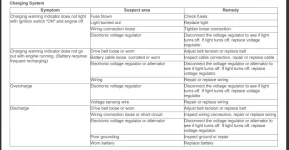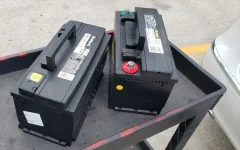The TL/DR is:
1) AGMs are more sensitive (vs. flooded cell) to temperature rise and over-voltage conditions
during charging, and modern cars designed for AGM batteries have "smart" charging circuits that vary both voltage and current during and after the charge cycle to prevent damage to the battery (similar to any modern portable electronic device with a lithium ion battery, but AGMs are much less sensitive to all of this than Li-ion, but that's another thread).
2) Our cars have "dumb" constant-voltage-constant-current charging systems designed for flooded cell batteries. The dumb CCCV charger doesn't know when the AGM battery is starting to get overcooked and doesn't know to let up, so it keeps right on cookin'. Does it blow up? No. Does it melt? nope. Does it slowly over time accumulate damage and lose capacity (akin to sulfation in a flooded cell)? Yep.
Perhaps the greatest perceived cost/benefit of an AGM battery is double the service life in an engine bay vs. flooded cell. Why pay $150 every 5 years when you can pay $300 for 10 (which for most of us is life of the car). But much of this "life span benefit" is already mitigated by the trunk mount. But that gain from trunk mount thermal stability is versus external sources (i.e. engine bay heat), not internal thermal excursions
during charging ... which is where most if not all of the thermal damage will come from in a trunk mount, which most folks don't understand and the AGM guys don't tell you. Their incentive is to sell more high-margin AGM batteries, not talk you out of buying one.
As I said above, there are plenty of folks out there who are running AGM batteries in their cars without issue. Your money, your car, your choice. That AGM in your ride will probably outlast the car... especially with 165k but who knows. Do like the former owner and go with AGM if helps you sleep well at night. But spending more to get the same or less is not my preferred cup of tea. My personal experience: my 2012 is on its second flooded cell battery. My previous 2012 had 3, and one of those 3 was the one I mentioned that failed in <90 days. Hence, my recommendation. For the long read, go here:
Battery University Homepage
Also: free advice is worth every cent. Double on the internet!













